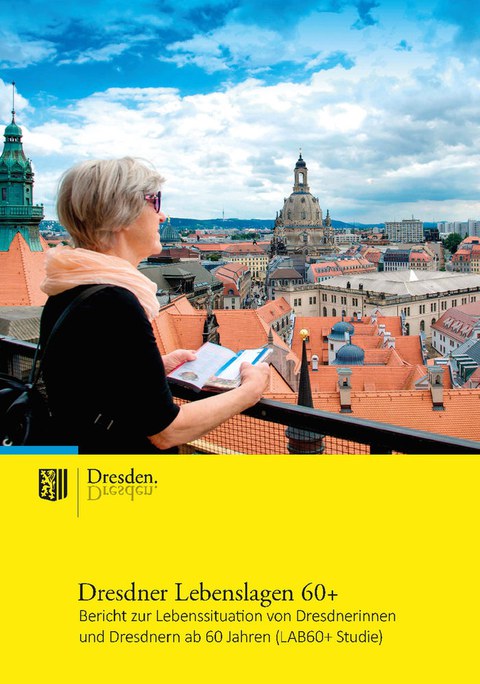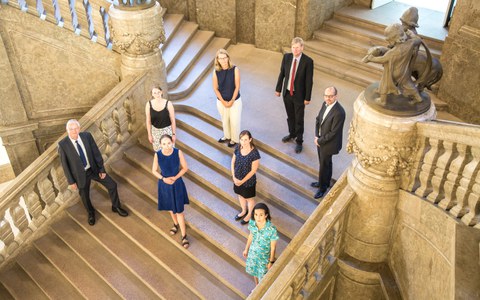Study on the "individual living, health and care situation of senior citizens aged 60 (LAB60+)"and above in Dresden
Background
The "LAB60+" project involves a representative survey of residents of Dresden aged 60 and older. The survey aims to record the current living conditions of senior citizens in Dresden, their expectations regarding social participation and health promotion, as well as the effects of measures taken to contain the COVID-19 pandemic on the target group. The results will be used to derive measures that enable seniors to reduce barriers to participation in social life, uncover and satisfy empowerment potentials, and live self-determined lives in their own age-appropriate homes for as long as possible.
To carry out this scientific study, the City of Dresden (Deparment of Labor, Social Affairs, Health and Housing) cooperates with the center for Demography and Diversity (CDD) of the Technical University of Dresden, represented by the chair of Work and Organizational Psychology, Social and Health Buildings and the Insitute of Occupational and Social Medicine.
Implementation
In order to be able to answer the complex question, various steps were carried out: A representative survey (by mail or optionally online) of Dresden residents, some of whom were also interviewed in person, and a survey of care facilities in Dresden.
The postal survey took place between February and May 2021. The sample was randomly selected from the city of Dresden's population register based on the Federal Registration Act. The approximately 6,000 individuals selected received a questionnaire in the mail. The questionnaire included questions on individual material circumstances, housing situation, health and leisure activities. 2,399 individuals took part in the survey.
In addition, more than 25 individuals agreed to participate in a telephone interview in which they answered detailed questions about their living situation.
We would like to express our sincere thanks to all the participants who took part in the survey!
Furthermore, a survey of inpatient care facilities as well as telephone interviews with outpatient care services in Dresden took place. The aim was to be able to make statements about the health and care infrastructure as well as care offers in the neighborhood with regard to care planning. For this purpose, a questionnaire was sent to all facilities providing full inpatient care, short-term care and day care (by mail and online). A total of 74 care facilities took part. 97 outpatient care services participated in the telephone interviews. We thank them for their participation.
Final report
The complete final report of the LAB60+ project is available for download here.
The separate annex to the report can be downloaded here.
Selected results
- The vast majority of participants (94 percent) live in apartments and houses with sometimes significant structural or spatial barriers. However, those affected are not sufficiently aware of advice centers and support services that can help them adapt their living space to suit their age or disability. The city is therefore planning campaigns to make housing advice and options for barrier-free design of housing more widely known.
- The creation of barrier-free public spaces as well as age-(ing)-appropriate open spaces and sufficient lighting of footpaths are a central need of the life-experienced Dresdeners. The city administration will examine which measures need to be prioritized.
- The majority (63 percent) do not feel lonely and are relatively well integrated into social groups. However, it is also a fact that about one-third of those surveyed feel somewhat to strongly lonely. The general sense of well-being in Dresden is below the German average. During the Corona pandemic, contacts were further reduced. It is therefore necessary to develop approaches and instruments that enable participation in cultural, social and civic life for all people aged 60 and older.
- Many seniors are overweight. Healthy eating lags behind recommendations, and alcohol consumption is one-third above recommendations, especially among younger seniors. Physical activity appears to be too low. Therefore, active healthy aging remains an important field of action for the city.
- The inpatient care facilities in Dresden are almost fully utilized (98 percent). The facilities describe the staffing situation as strained. Innovative care concepts and sufficient places for those in need of care with special nursing needs are necessary. The operators would also like to see an increase in the recruitment of skilled workers. To this end, a specialist discussion is planned in the "PflegeNetz Dresden" and with the participating service providers.
- The media usage of the participants is very heterogeneous. As expected, older people in particular tend to use traditional media. Younger people make extensive use of digital information channels and communication platforms. For this reason, information should continue to be published in a way that is appropriate for the target audience, and digital offerings should be developed further in a targeted manner so that they become more widely known and used.
- Many participants engage in volunteer work or want to continue volunteering into old age, for example by providing assistance in their neighborhood. Civic engagement supports the formation or maintenance of social networks. In the future, efforts will be made to expand target-group-oriented services that are close to home and to bring them together even better.
- Dresden's approach to creating and further developing an infrastructure suitable for the elderly is to be developed further. Many of the senior citizens' wishes are already anchored in the new specialist plan for senior citizen work and assistance for the elderly and will be further supplemented and deepened in the future. To make this possible, there will also be a regular survey in the future to continuously survey the needs of residents over the age of 60 and to adapt current developments and funding accor.
If you have any questions about this project, please contact Dr. Karla Romero-Starke (project coordinator; phone: 0351 3177-453; e-mail: ).
Further information
The detailed study information (also available as PDF for download) can be found here: Study information
Answers to frequently asked questions can be found here: FAQs


